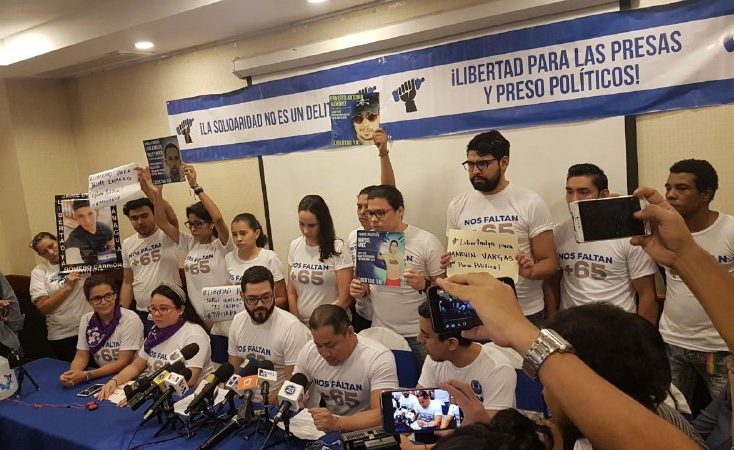91 political prisoners are released in Nicaragua, but harassment continues
Washington DC, January 9, 2020. On December 30th, the Nicaraguan government released 91 political prisoners who had been detained in prisons across the country for anywhere from two to eighteen […]

Washington DC, January 9, 2020. On December 30th, the Nicaraguan government released 91 political prisoners who had been detained in prisons across the country for anywhere from two to eighteen months. Among the released were sixteen activists arrested for bringing water to a group of prisoners’ mothers who were staging a hunger strike to demand the release of their children.
The move was announced as pressure grows in Nicaragua and internationally for the liberation of political prisoners. The government allowed the International Committee of the Red Cross, the Office of the Nicaraguan Human Rights Ombudsman and the Apostolic Nuncio of Nicaragua, Waldemar Sommertag, to take part in the process.
Political prisoners were transferred to their homes and placed under house arrest, according to the Nicaraguan authorities. As a result, they still have judicial proceedings pending against them and restrictions on their movement.
The 16 activists known as the “water carriers” denounced on Wednesday that their judicial process was “completely irregular and marked by a series of restrictions which make it very clear that we continue to be treated as guilty, although we have not been judged.” Their trial is scheduled for January 30.
According to data from the Nicaraguan Center for Human Rights (CENIDH, by its Spanish acronym), among the 91 released, there are 41 who have already been convicted, 39 who are still being prosecuted and 4 who were detained but never had charges brought against them.
Repression continues
Several former political prisoners have also reported that since their release, they have been threatened and harassed by groups linked to the government and police.
The young Belgian-Nicaraguan Amaya Coppens and her family have suffered several aggressions. On January 1st and 2nd, a group of men aboard motorcycles threw black oil on the walls of their house in Estelí and threw stones at their windows. Police have also lurked near the house constantly since her release.
“The attacks continue on a daily basis. It is difficult knowing that my family is still victimized, but we are trying to stay protected as best we can,” Coppens said on Wednesday.
CENIDH requested that the Inter-American Commission on Human Rights (IACHR) examine the possibility of irreparable damage to the family’s rights to life and physical integrity. CENIDH also called for the Commission to urge the State of Nicaragua to cease the “aggressions and harassment by officials and para-police groups” against the family.
Last December, the IACHR granted precautionary measures to Amaya and the other 15 young people detained for bringing water to the protesting mothers, finding that their life and physical integrity were at risk in the custody of the Judicial Directorate in Managua.
Other former prisoners, including Roberto Buchting, have reported constant harassment, including the continuous surveillance of their homes by para-police groups, threats over social media and even invasions of their homes with the intent to intimidate them.
Still in prison
After an extensive review of the lists of released persons, CENIDH confirmed that 65 political prisoners are still to be released.
“Our commitment to the liberation of all people and all of Nicaragua is firmer than ever. Despite the fact that a group of 91 people was released on December 30th, there are still more than 65 political prisoners, including Katherine Martínez and the trans activist Mayela Cruz,” said the group.
Race and Equality demands the immediate release of all political prisoners in Nicaragua, the closure of legal proceedings against them and the cancellation of their criminal records. We call on the authorities to cease repression, harassment and persecution against those who were arbitrarily imprisoned. It is essential that their return home is free from any threat or attack against them or their families.

